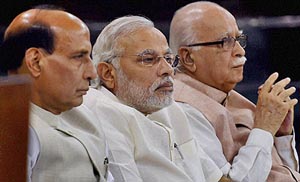Surajkund (Haryana), June 28: Prime Minister Narendra Modi on Saturday gave tips to the newly-elected MPs of BJP on how to maintain standards in public life and take the message of good governance to the people.
After inaugurating a two-day workshop for over 150 newly elected Lok Sabha and Rajya Sabha MPs of BJP, Mr. Modi guided them on how to nurture their respective constituencies and make use of the media, especially the social media in spreading the party message.
BJP leader Venkaiah Naidu told reporters that the workshop for the first time MPs of the party was organised to train them in Parliamentary procedures and make them aware of the BJP ideology.
Mr. Naidu said the Prime Minister guided the MPs on how to “maintain standards in public life, how to take the message of good governance to the people, the message of BJP and in turn of Mr. Modi to people”.
BJP leader Jagdish Mukhi, who is in charge of party affairs in Haryana, said the Prime Minister told them that their responsibilities as members of the ruling party are different and they should behave accordingly.
Mr. Modi told them that they should treat the rule book on Parliament proceedings like the Bhagavad Gita and should not step out of it. He also advised them not do anything in Parliament without the permission of the Chair.
The Prime Minister asked the new MPs to inculcate good parliamentary practices and good conduct in their public life.
Haryana BJP president Ram Bilas Sharma said Mr. Modi, who is also a first time MP, wanted to stay for the entire length of the workshop but could not do so as he had other responsibilities to fulfil in his new role as Prime Minister.
Mr. Modi arrived here at 8.30 on Saturday morning and inaugurated the workshop with Home Minister and BJP president Rajnath Singh and spent about two hours.
The workshop will be addressed by senior party leaders like Sushma Swaraj, Arun Jaitley and Mr. Naidu during the day.
Party leaders had earlier said that the workshop will impart training to them on how to put good questions in Parliament and the kind of urgent public matters to rise during Zero Hour debates in both the Houses.
The workshop will also stress upon them to improve their attendance in Parliament and strengthen their skills by reflecting on problems of their constituencies and mitigate public suffering by helping to find solutions for them.
The MPs will also be given some lessons on their public conduct.
The workshop comes ahead of the Budget Session of Parliament starting July 7.





Comments
Add new comment